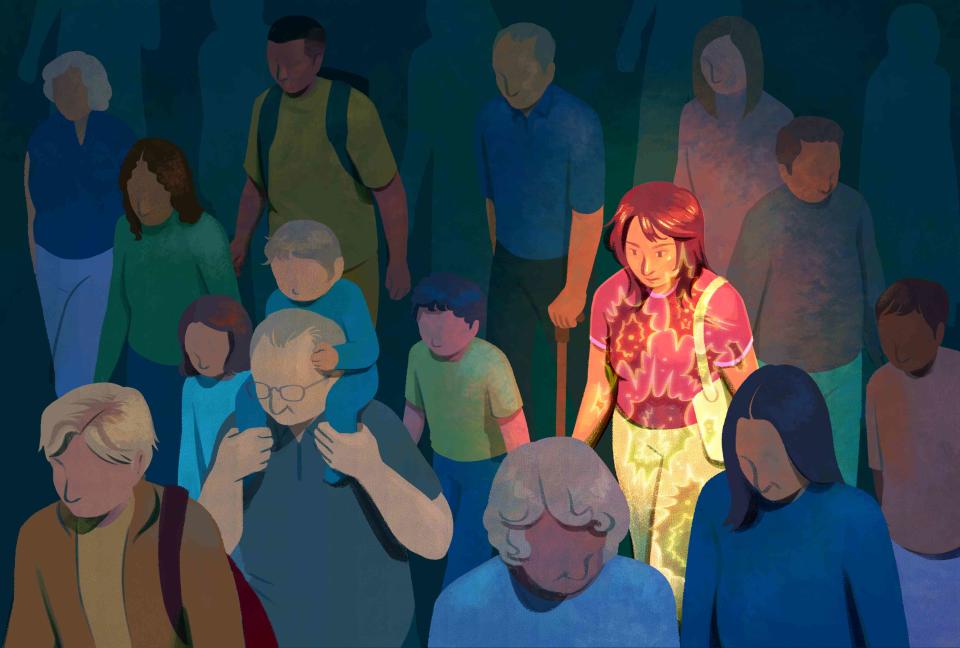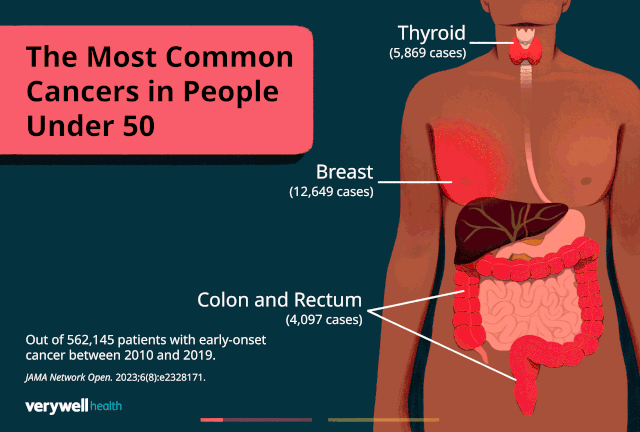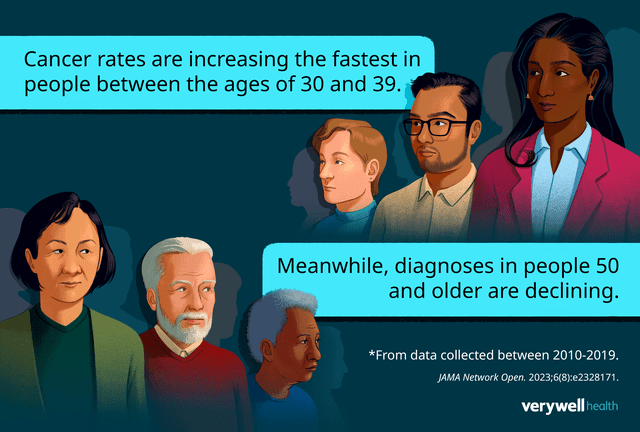Why Is Cancer Rising In Young Adults?
Colorectal cancer is killing more people under 50 than ever before. The potential causes are complicated.

Cancer most commonly develops in older adults. In the past few decades, however, younger adults face more frequent, and often more aggressive, diagnoses of colorectal cancer, pancreatic cancer, and other cancer types typically not seen until later in life. Those diagnoses may upend their lives during some of the most formative and pivotal years.
Between 1999 and 2019, early-onset cancers—those diagnosed in people younger than 50—increased by nearly 15%, while cancers in older adults declined, according to the National Cancer Institute.
“This is really the ‘sandwich generation’—many of these people are parents who are also taking care of their own elderly parents,” said Kimmie Ng, MD, MPH, a gastrointestinal oncologist and the founding director of the Young-Onset Colorectal Cancer Center at Dana-Farber Cancer Institute.

Illustration by Mira Norian for Verywell Health
Between 2010 and 2019, women and people in their 30s saw disproportionally high rates of cancer, according to a study published in August in JAMA Network Open.
“It’s a really busy time of life to be faced with a terminal cancer diagnosis,” Ng said. “Many are trying to start families or are not done expanding their families, so fertility considerations and sexual health are really major concerns. And many have financial difficulties and a lot of psychosocial distress when faced with this type of diagnosis at a young stage of life.”
Related: 'You Can Learn Lessons From the Darkness': What It's Like to Have Cancer at a Young Age

The JAMA Network Open study showed the greatest number of diagnoses for cancers in people under 50 were in the breast, thyroid, and colon or rectum.
The fastest-growing cancers among young adults, however, are cancers of the appendix and the intrahepatic bile duct—the thin tubes that connect the liver, gallbladder, and small intestine. Digestive tract cancers like these increased by 15% over the study’s 10-year period.
Researchers in an earlier study found that colorectal cancer has increased by about 2% per year in people younger than 50 since the mid-1990s. A person born in 1990 has quadruple the risk of developing colorectal cancer at a given age, compared to someone born in 1950 at the same age.

Why Are Cancer Cases Rising Among Young People?
Researchers largely agree that shifts in lifestyle in the U.S. are key drivers of cancer risk. Eating ultra-processed foods and lots of red meat, drinking sugar-sweetened beverages, not getting enough exercise, and sleeping poorly all appear to make people more susceptible to cancer.
The early-onset cancer trends appear to be especially strongly linked to rising rates of obesity. A study published in Lancet Public Health in 2019 showed that half of obesity-related cancers have become more common in young adults, compared to one in nine non-obesity-related cancers.
Scientists are just beginning to understand why some of these factors contribute to cancer risk, Hyuna Sung, PhD, senior principal scientist at the American Cancer Society and an author of the obesity study, told Verywell.
“When you don’t know much about risk factors, it’s difficult to establish prevention strategies. We need more studies to look into all the lifetime exposures to identify those risk factors and those results should be able to inform how we can prevent and detect all of these cancers,” Sung said.
Takeaway
The U.S. isn’t alone. Globally, cancer was the fourth most common cause of death in people 15 to 39 years old in 2019, and countries with the greatest social and economic development saw the greatest increase in early-onset cancer diagnoses.
Young people tend to be diagnosed at later stages than most older people, which makes their likelihood of survival lower, Ng said. It’s also possible, she added, that something biological differentiates tumors in some young people, making them more aggressive and likely to lead to death.
“I can tell you just from seeing so many young patients in my clinic that many of them—most of them actually—are not obese. They’re healthy,” Ng said. “They’re often marathon runners, and they often follow a healthy diet and eat organically. There’s something else going on.”
Should Young People Get Screened for Cancer?
Healthy people younger than 45 are typically not eligible for cancer screenings except to detect cervical cancer.
Health providers may find early signs of cancer in young people when giving a medical scan or test for an unrelated symptom or condition, Sung said. Sometimes, for instance, a routine blood test identifies signs of thyroid or kidney cancer.
While the increase in diagnoses of some early-onset cancers, like appendix cancer, may be attributable to changes in screening approaches, that is not true in most cases, Sung said. In the case of colorectal cancer, the number of late-stage detection suggests that the actual number of cases is increasing, and not just the rate of screening.

Illustration by Mira Norian for Verywell Health
In some cases, earlier or more frequent screening may not be the answer to early detection or prevention. For instance, many young people who develop lung cancer are not smokers, according to Jaclyn LoPiccolo, MD, PhD, an attending physician in thoracic oncology and an investigator on the Young Lung Cancer Study at Dana-Farber Cancer Institute. Understanding the genetic basis for lung cancer and the role of certain environmental exposures could help scientists offer targeted screening to young people.
“We may be able to identify patients who are at a higher risk of lung cancer based on genetic predisposition, and our hope is to investigate screening in that population of people,” LoPiccolo said.
The COVID-19 pandemic interrupted routine medical care for many people. Between 2019 and 2020, there was a 10% to 13% drop in cancer diagnoses. Rather than a sign of improvement, those numbers could reflect a falloff in screening and delayed care, Sung said, which could impact cancer outcomes for the next generation of young adults.
“Monitoring the trends, especially among young people, is important because the trends in young people reflect the newly introduced carcinogens to a given population. And that can be a bellwether for future cancer burden,” Sung said.
Story editing by Daphne Lee and Anisa Arsenault. Research analysis and data visualization by Julia Ingram. Fact checked by Nick Blackmer. Illustration by Mira Norian. Photo illustrations by Amelia Manley. Visual editing by Doan Nguyen, Arif Qazi, and Olivia Hunter.
Read the original article on Verywell Health.

